Water of wonders in Usaka community, Akwa Ibom state. (Photo provided by Ndifreke Jacob).
Ndifreke Jacob
When I first heard afternoon sex and adultery is forbidden in Usaka, a rural community in Obot Akara local government area, Akwa Ibom state, my mind quickly raced to one elderly woman I met at a seminar about three years ago.
I was at a Gender Based Violence seminar when one woman probably in her late 50s said during the breakout session that she got married to a sexually active man that almost killed her with sex.
At some point, she got really fed up of giving in to his insatiable sex craving and demands. She had to set him free like a bird to the street for other women to have a taste of him.
Her reasons – she was a granny already and needed to give her aging body a break and enjoy the beauty of family and aging. In sum, her strength didn’t match the man’s own again despite him being older than her.
For a second, I thought about that woman’s husband and how men like him would have fared in Usaka where they can’t meet madam when the sun is out and scorching.
I’m sure there are many men like that in Usaka who are suffering in silence and can’t do anything because they were born into a society where the gods regulate sex time.
But come to think of it, why should the gods be interested in sex?
Of all the things in the world, why sex?
I’m sure the gods of Usaka didn’t read any medical journal or about the benefits of sex before setting that timer. Cos, what the heck is that?
As funny as this sex timer thing sounds, it’s a strictly followed rule in Usaka. Kids grow to follow in the way of the gods, men become grannies and pass down these highly respected tradition in Usaka to generations.
This is what I found out when I joined the Uyo City Hikers to its Usaka hike on 10 June, 2023.
• The Journey: How did we get here?
How we got here right?
So I have a friend who’s one of the coordinators in Uyo City Hikers – a group of young nature finders and explorers in Akwa Ibom State.
For those who do not know much about Akwa Ibom or are reading for the first about this State.
Akwa Ibom State is actually one of Nigeria’s Oil rich States and a minority group sitting peacefully in the South South part of Nigeria.
Akwa Ibom State or Land of Promise like it’s called covers a land area of approximately 7,081 square kilometers (2,737 square miles).
The oil rich State is bordered by the Atlantic Ocean on the south and has an estimated population of about 6.7 million people.
READ ALSO : Uyo to Calabar : Dangerous on land, convenient on sea
With its capital in Uyo, Akwa Ibom State is fast becoming a rapidly growing city with modern infrastructures and sites for tourists seeking a feast with nature.
The State is primarily inhabited by the Ibibio, Annang, Oro, Ekid and Obolo people who speak mostly Ibibio, Annang and Ekid dialect alongside pidgin and English language .
The State aside its rich people, languages and culture, also boost of abundance of natural resources like oil and gas, clay, coal, limestone, salt, vast seafood, crops and vegetation.
It was on the premise of this vast blessing endowed Akwa Ibom State, that the Uyo City Hikers set out to dine and wine with nature in Usaka.
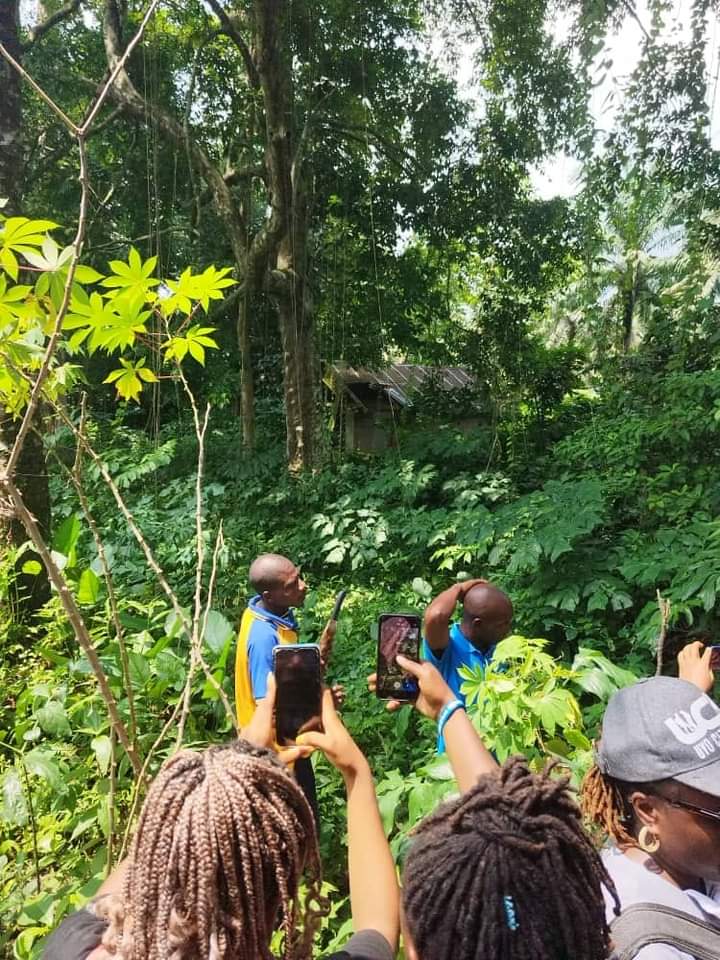 Excited hikers savouring the wonders of Usaka forest. (Photo provided by Ndifreke Jacob).
Excited hikers savouring the wonders of Usaka forest. (Photo provided by Ndifreke Jacob).
Actually, hiking wasn’t really our thing. It’s more like a new baby in the hood because we used to sit in our homes and watch Discovery Channels on TV to see white people climb mountains, hills, traverse dangerous terrains and obstacles all in a bid to hike and discover trails and explore nature.
May be this is why it took me like ages not to give into my friend’s countless hike invitations. But here we are, carrying my lazy self and joining the bus to somewhere outside the State capital for hiking.
• Usaka in Obot Akara local government area
Obot Akara Local Government Area came into existence on December 4, 1996, when it was carved out of Ikot Ekpene Local Government Area under the administration of General Sani Abacha, who was then the Head of State of Nigeria.
Situated within the Equatorial region, Obot Akara lies between latitudes 5000′ and 5030′ North, and longitudes 7030′ and 7045′ East of the prime meridian.
It covers a landmass of 157.5 square kilometers and had a population of 148,281 people according to the 2006 population census.
Obot Akara Local Government Area shares boundaries with Abia State and Ini Local Government Area to the North, Essien Udim to the South, Ikot Ekpene to the East, and Abia State to the West. It also has a common boundary with Ikono.
The Qua Iboe River traverses Obot Akara local government area, flowing from Nsaraa in Abia State through Usaka, Atan Ibong, Nto Ekpe, and up to Ikot Amba. Another river, which passes through Nko, Uruk Uso, and Ikot Idim, joins the Qua Iboe River at Ikot Abia.
The abundant water resources bless the people of Obot Akara, who engage in fishing and farming.
The availability of sand and gravel in commercial quantities is another benefit of these water bodies. Additionally, the local residents are involved in wildlife activities and oil palm trade.
Ariam market serves as a significant trading hub where the people of Obot Akara local government area conduct business with their Igbo neighbours.
• The road to Usaka: What I could make sense of?
The Journey to Usaka began when all the hikers who had paid the hike token mustered at Ibom Hall, another historical place in Uyo by 6a.m to set out for the journey.
While we mustered, friends exchanged banters, new love found hands clinging, bond and new faces smiling at each others and catching up on all the gist that comes with hike experience.
It was time to move after waiting for the buses to arrive. In groups, the coaster buses left for Usaka with excited faces and lips chanting different songs and waving at commuters at every slow drive.
For newbies like me, I was very anxious to see what Usaka holds for my curious mind. I wanted to see what I haven’t seen, that led the UCH to set a trail in Usaka.
The journey from the state capital to Usaka was a smooth drive until we got close to the hanging bridge in Obot Akara, the local government that houses Usaka.
The dilapidated metal bridge hanging like a pendulum has been on the news for many years with hope of being reconstructed. I’m sure even the people are tired of calling on radio to talk about the bridge.
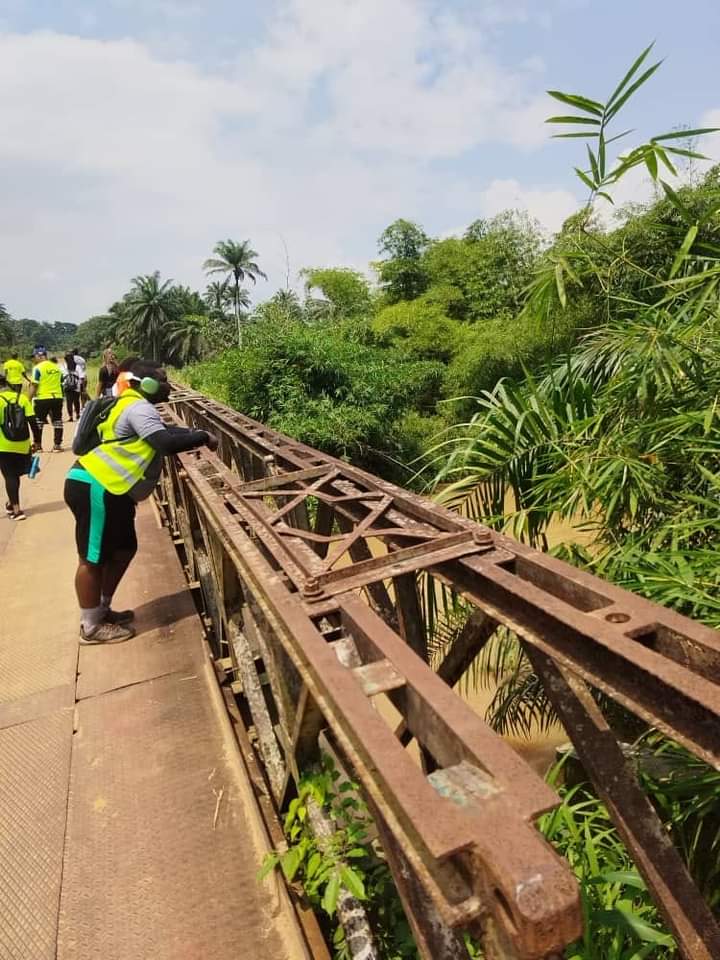 Hanging, metal bridge in Usaka. (Photo provided by Ndifreke Jacob).
Hanging, metal bridge in Usaka. (Photo provided by Ndifreke Jacob).
Many representatives from the LGA have visited the spot and government made promises to reconstruct the bridge but still no hope in sight.
That’s by the way though. We alighted at the bridge and like flies we gathered to have snapshots of the bridge before proceeding on our journey.
The journey was without bumpy roads and stops.
• Consultation of the gods: My first culture shock in Usaka
For someone like me who’s a bonafide Annang daughter, nothing prepared my mind for the consultation that came with our arrival in Usaka.
I’ve seen movies where people set out into forests and never come out. Was this what we were about to witness? I thought to myself.
Usaka isn’t a land you set out on such adventure with such number of persons without seeking the consent of the gods of the land. We however learnt about it.
With all the hikers surrounding the village youth leader and the tour guide, who poured out fresh palm wine from the keg, chant different names of the gods of Usaka and sought for protection of all the hikers.
From the local gin (kaikai) poured to the garden eggs and kolanut broken, the Youth leader made specific prayers for the hikers to venture into the forest of Usaka and come out in complete numbers.
 Usaka community youth leader pouring libation to gods for safety and protection.(Photo provided by Ndifreke Jacob).
Usaka community youth leader pouring libation to gods for safety and protection.(Photo provided by Ndifreke Jacob).
He made special appeal against bites from wild snakes or harm. He asked the gods to send protective coverage over the hikers, and stressed that we were only fun seekers and not warmongers.
A quick head count for specifics and organisation was done as we gathered in groups and introduced ourselves before setting out for the hike.
Did I tell you we sipped from the remaining of the drinks used for the consultation? I’m sure you didn’t expect us to miss sipping such fresh palm wine? I actually did as well as others.
Usaka Hike: This is where we finally set the trail for the day.
In group of four, we set out for the trail into Usaka forest. But before then, i made a a brief stop at the famous Usaka holiday camp which was used by Gulder Ultimate Search some years ago.
I wasn’t doing taking a shot when I heard the group coordinators call out to hikers behind to increase the pace.
The call was a call everyone adhered to no matter their size or status. The group coordinators were in charge at least to cheer hikers and encourage them on the Journey.
We set forth on the journey, waving at villagers going to their farms including those standing at akimbo in front of their houses.
There were few misunderstanding with the village youth who felt we were government people or had affiliation with government. We were almost victims of government and Gulder brand failed promises to Usaka people but all that were sorted out with all parties agreeing to meet on a roundtable to discuss the development of tourism in Usaka on a later date.
With more 100 hikers, we ventured deep into the Usaka forest leaving ourselves to the bath of nature’s free air and ‘chillness’.
We traversed different chilly vegetations smelling of unrestricted ‘villageness’ and mass red earth which signpost an indication of a land reeked of modern life.
The atmosphere worn a condense setting and innocence like it was just unwrapped like a packaged wife in our grandfather’s days.
I could feel my nostril breathe a heave of relief for the first time in a lifetime. As we dig deep into the bushes like a hungry lion looking for prey, our eyes hung in anticipation for possible obstacles to be encountered. What’s a hike without obstacles?
You dare not venture into the abode of the gods and not meet an obstacle, at least I’ve enough Nigerian movies to know this. So I wanted to have a feel of it to add to my list of boxes ticked, but I didn’t actually.
After about 15,000 steps, we finally got to the place that holds the rich history, dos and don’ts of Usaka – The Usaka council shrine, luck shrine and water of luck/request.
• Usaka council shrine: sacred and spectacular
I grew up to read that throughout history, shrines have played a central role in religious and cultural practices, serving as sacred spaces where people seek solace, offer prayers, and connect with the divine.
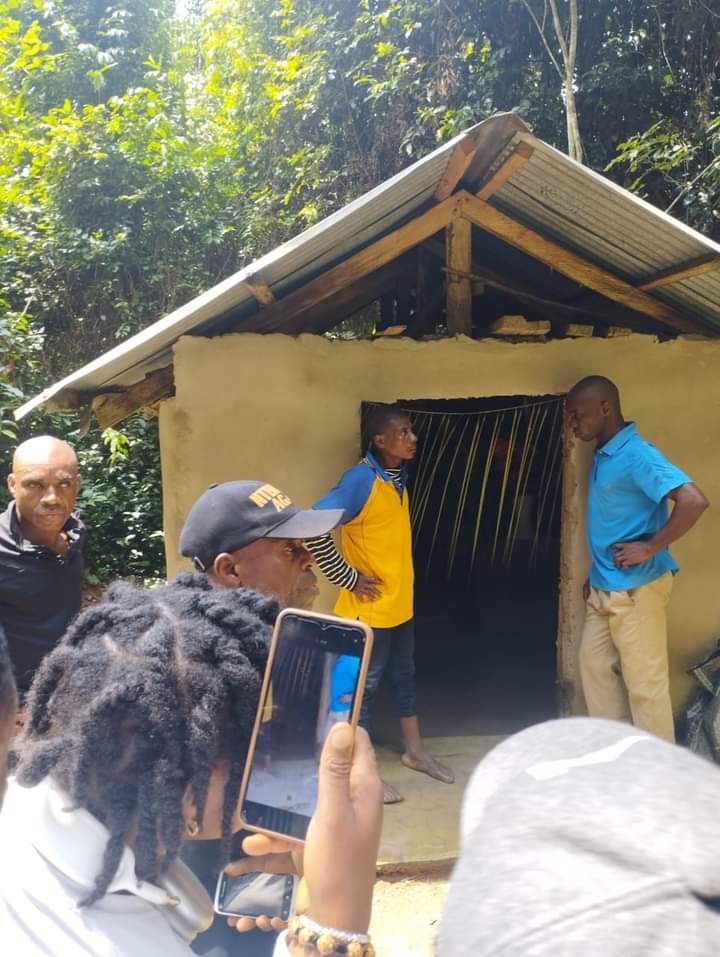 Usaka council shrine administered by gods. (Photo provided by Ndifreke Jacob).
Usaka council shrine administered by gods. (Photo provided by Ndifreke Jacob).
For Usaka council shrine, it was more of a place where the gods sat on cases of men even when Nigeria has an existing law recognised by government.
Usaka has its own court presided by the gods.
According to the tour guide, the Council Shrine was more of a highly secluded court where cases of high significance were tried. Cases like infidelity, denying a pregnancy and others were tried there while light cases were heard at that the regular village hall.
At the council shrine, the gods hear matters brought before them through the elders and give judgement. Once a case is heard, the suspect is allowed to go home but is banned from having an haircut for one year.
The consequences of being tried at the council could include death warrant but depending on the nature of offence committed.
The council shrine is actually located in a secluded dense forest with age-long tall trees, leaves and branches forming shade for the tattered looking shrine covered with a dirty white cloth. The rusty metal roofing sheet which is dilapidated shows it’s a rarely visited place. May be Usaka hasn’t had any serious case to be tried there because the place looked way abandoned.
We were not allowed to go too close to the shrine because of its ‘holiness’ but we however took pictures from a distance.
From there we made another round of hike to the mystical luck shrine.
• Usaka luck shrine: A place where the gods hear heartfelt cries.
Just like the Meiji shrine – Tokyo, Japan, the Usaka luck shrine is nestled within the heart of the mystical forest. A palm frond tied to one big tree (the oldest tree in the village) from one end to another acts like a door to the entrance leading to the popular shrine.
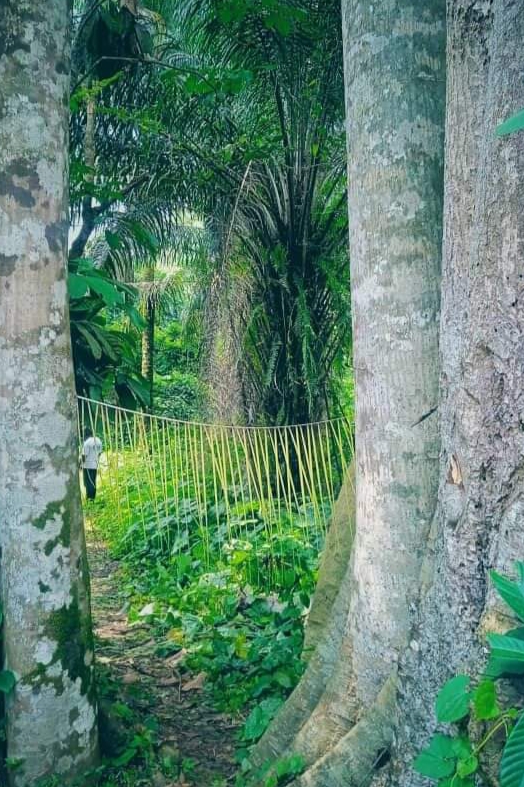 Usaka luck shrine. (Photo provided by Ndifreke Jacob).
Usaka luck shrine. (Photo provided by Ndifreke Jacob).
Few metres from the first palm frond is another tied to separate the shrine. From the point of the second palm frond, hikers were touted to take off their shoes before making way into the compound where the shrine is standing.
At the shrine, a man presumed to be the custodian of the shrine briefed the eager hikers about the wonders of the shrine.
According to him, the shrine built with cement and unpainted was a place where people including church founders came to seek answers to their request, supernatural powers for deliverance and miracles in their different ministries.
After briefing us, he however went inside, made incantations before allowing the hikers to go in. Every hiker that went into the shrine to make a request dropped money on the floor and said his request to the gods.
The custodian told us once a person’s request is granted by the gods, the person will have to return to Usaka for thanksgiving.
It was the clause that got people screaming because how do you begin to set out on such journey again to thank the gods of Usaka. Well not for somebody like me although I went inside to request for the latest iPhone 14 which I’m yet to see.
It was literally the least thing I wanted because I have this burning urge to start my travel vlog. So if the gods of Usaka can grant it, why not ask them? I actually made my request with 500naira.
So, the hikers took turns to go into the shrine to make their requests. It was another beautiful experience for the hikers including myself.
Just behind the shrine is a dense sloppy hill that’s descended with the aid of a thick plant rope called mkpan-iruk.
• The Usaka water of wonders
Like the Notre-Dame Basilica – Montreal, Canada, the Usaka water of wonder sits deep inside a green lush bush cascaded with the aid of a plant rope. The water is said to possess great healing powers and is a sought after spot for religious leaders and founders who seek miracle and deliverance in their ministries, according to the tour guide.
The chilly not so pure looking water sits in a pit at the foot of a big tree inside the forest. It is a treasured water by the Usaka people. It is scooped with moderation and discipline.
Even though it was just lying there at the forest, it had a fee for its use. Anyone who needed the water dropped a token before scooping it.
At this point, I paid 50naira to get 1litre of the miracle water which is lying at my backyard for now. May be it will have use some day. Who knows?
Also, beside the big tree were patches of torn naira notes dropped at the foot of the tree by earlier visitors. Some notes were soaked in the wet earth while some were covered with leaves. The newly dropped notes by the new visitors (hikers) laid too in the open forest.
I’m sure nobody eats the gods money in Usaka because why would Nigeria’s currency be lying at the foot of the tree without anyone using it. Mehn, that’s a legal tender for God’s sake.
The monies dropped at the foot of the tree and inside the shrine without being used could feed a handful of families in Usaka.
Despite housing these rich historical relics and wonders, Usaka has nothing to show for its blessings. It could be likened to a land filled with milk and honey while the owners slept on hungry bellies.
• Why Usaka is special: The hikers give reason
In my curiosity, I however ambushed the Convener of the Uyo City Hikers to know why she opted for Usaka of all places in the State.
According to her, the group choose Usaka because it has a false reputation for not being a peaceful place and a largely abandoned community by government. The group decided to embark on the hike to draw government’s attention to Usaka.
She went further to say the group’s intention is to turn Usaka into a tourism village.
Also, one of the UCH Coordinators, Mr Idongesit Effanga who spoke about the Usaka experience said it was one of the most longest trails the group has covered since they started the hiking group.
He noted that Usaka could be developed and turned into a tourism destination in the State because of its long trails.
To the Publicity Manager of Uyo City Hikers, Miss Onyeka Felix who corroborated what the Convener and Coordinator said, noted that Usaka trail was the best hike ever the group has embarked on and distinctive because of its rich historical relics.
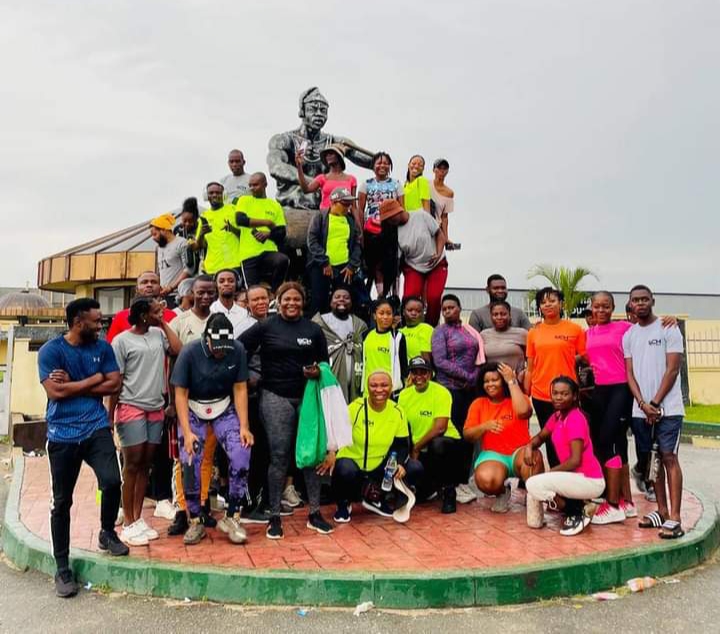 Uyo city hikers posing for photograph during a visit to Usaka. (Photo provided by Ndifreke Jacob).
Uyo city hikers posing for photograph during a visit to Usaka. (Photo provided by Ndifreke Jacob).
• What does the tourism industry hold for Usaka if developed?
According to tourism data gathered online, the revenue in the Travel & Tourism market is projected to reach US$2,953.00m in 2023.
Another study says travel and tourism contributed 3.6 percent to Nigeria’s GDP in 2021, which was equal to around 16 billion U.S. dollars. Compared to 2020, the contribution of travel and tourism to the Nigerian economy experienced an increase.
A Nigeria Tourism Industry Outlook 2022 by Reportlinker hinted that “The market has grown an average of 1.8% year-on-year since 2000, with a total increase of 13.7% over that period.
The market prospect for tourism is high according to report as tourist expected to visit Nigeria are estimated to reach 6.7 million by 2026, up from 6.1 million in 2021.
• Why can’t Usaka tap from this enormous untapped industry?
Over time, so many spiritual sanctuaries around the world have undergone a remarkable transformation, evolving into popular tourist destinations that captivate visitors from around the world.
With the development of Usaka through transformation of the shrines into tourist sites, tourism doors would have been opened as well as commercialisation and the preservation of the Usaka religious sanctity.
Usaka people have successfully managed to retain their spiritual essence while embracing the influx of visitors.
I think it’s time for government and brands to invest in Usaka as it holds lot of revenue potentials for the State and Nigeria.













